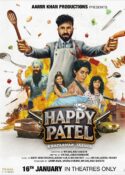
(L-R: Sanjay Pugalia (NDTV), Nikhil Madhok, Head of Originals, Prime Video, India, Shubh Shivdasani, Salona Bains Joshi, Gaurav Gandhi, Vice President – APAC & MENA, Prime Video, Sudip Sharma, Vikramaditya Motwane, and Nikkhil Advani)
At the panel ‘Taking the Leap: Storytelling from India, by India, for the World’, held at WAVES, some of the industry’s biggest filmmakers indulged in a conversation on creating Indian content that resonates with global audiences. The conversation also delved into how streaming is continuing to change content creation in India.
“With streaming services like Prime Video, filmmakers now have creative freedom and can think beyond just that two hours in a movie theater,” said Vikramaditya Motwane, who created and directed the series Jubilee. He stressed that creators have the freedom to tell all kinds of stories, however there is still some grounds to cover. “We aren’t there yet, but it’s only a matter of time before we get there,” he added.
Nikkhil Advani who created and directed Mumbai Diaries, and is busy shooting for his upcoming series The Revolutionaries, emphasized the power of authentic research in storytelling, saying, “I believe it’s the source material and the research which matters the most. Whenever you have anything to do with period storytelling, the richer the material is, the more the research that has gone into the material, that is always a good starting point for us.” However, he added that period stories also need to be made interesting for young audiences. “If we start giving history lessons, audience will lose interest,” he said.
Paatal Lok’s creator Sudip Sharma offered fascinating insights into character development, stating, “A character evolves over a period of time over multiple criteria. Then the actor comes in and brings his or her own thing. Then on the set, some other magic happens.” Speaking about Hathiram’s enduring appeal, he added, “There’s something very authentic and honest about Hathiram that connects with most people — he’s not trying to be anyone else… That authenticity and ability to surprise is what has really stood out.”
First-time creators, Shubh Shivdasani and Salona Bains Joshi (Dupahiya) spoke about female gaze in storytelling, “To begin with there was no such intent of focusing on female characters only. We have two other co-creators and writers who are male and they have written the female characters for Dupahiya very well. But we would ask questions to each other. We come from different backgrounds and more than female gaze, it was about small town and city audiences. We wanted everyone to be able to enjoy the story we want to tell. Every character was charted keeping in mind that even if it’s a comedy, people should not comprehend it incorrectly and everyone should be comfortable watching it.”
Talking about Prime Video’s approach to selecting genres, Nikhil Madhok, Head of Originals, Prime Video, India said, “Early on we realized that in India it’s the themes which are really important. I would say the theme is like the soul and the genre is the body, and that combination is what we look for.” He explained further, “One of our themes is in the space of women breaking stereotypes, and in that space, we recently launched a series called Khauf. It’s about the challenges that young women face when they come to live in a big city. It’s also about dealing with past trauma. That’s the theme. The genre of the story is horror. Another theme is courage and valour in Indian stories. That courage can be at the border as in the movie Shershaah, or a doctor showing courage under fire as in Mumbai Diaries, or the protagonist Manoj Bajpayee showing courage in The Family Man or an honest cop like Hathiram Chaudhry in Paatal Lok. Another theme is aspirations of Bharat, and we told these stories in the genre of humour, for example Panchayat and Dupahiya.”
Gaurav Gandhi, Vice President, Asia Pacific & MENA, Prime Video, highlighted how universally relatable stories offered by streaming services have expanded the linguistic palette of the viewers, “We realized that to really make an impact in India, we have to really think local and as a market, we are so diverse that there is no one local, so we have to think about local in multiple ways, local languages, local milieu, local cultures, local taste, and so on. Earlier, everybody was locked into their own language, and we had the opportunity to program in multiple languages, leading to an expansion in the linguistic palette of Indian customers. Today, almost 60% of the customers on Prime Video India stream content in 4 or more Indian languages.”
Winding up the discussion Gaurav also spoke about the need for risk taking appetite from the creators as well as streaming services. He reiterated the need to be intentional to get diverse voices, newer voices, newer creators to come in, and existing creators to pitch and great stories to win. He also spoke about how good shows raise the standard for the industry and how the industry is collectively learning from everyone involved and from customers, who indicate their preferences and express their love for certain content, guiding the creation of more of such stories.











